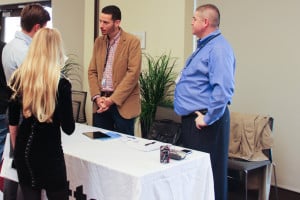
On Tuesday evening, the Graduate School of Business (GSB) hosted the third annual Israeli Entrepreneurship Fair, an event for Israeli companies from Silicon Valley to recruit potential employees and to share what they do with Stanford students. Approximately 300 people came over the course of the evening, and the room was filled with students and company representatives.
Fifteen companies were represented at the fair, with areas of expertise ranging from social media to crowdfunding to medical technology. The only two requirements for a company to attend are that at least one co-founder is Israeli and that the company is based in Silicon Valley.
Several representatives also presented to attendees, and Israeli entrepreneur and former president of AOL Platforms Amir Ashkenazi gave a keynote address. Ashkenazi’s presentation was entitled “How to Create a Successful Startup” and included advice to hopeful entrepreneurs such as how to choose a venture capitalist partner and what qualities startup ideas must have in order to take off.
Sponsored by the Career Management Center at the GSB and Hillel, among other groups, the fair was an example of the already strong relationship between Stanford and the Israeli business sector.
“When you look at the education backgrounds of all the [GSB] professors, the most overrepresented university outside the U.S. is Hebrew [University],” said Ophir Samson, a first year graduate student at the GSB and one of the organizers of the fair. Tal Briller, who works in tech in Silicon Valley, and Yaron Fishelson, a staff member at Hillel, also organized the fair.
Samson added that the link between Stanford and Israel extends beyond its faculty. He explained that Israel, like Silicon Valley, has a culture that is well disposed to startups and tech companies.
“There’s more venture capital per head [in Israel] than any other place in the world; there are more startups per capita than any [other] place in the world; and The Economist recently voted it the second-best place in the world to be an entrepreneur, after Silicon Valley,” Samson said. “So naturally there are strong links between Silicon Valley and Israel. And the [GSB] has a very… important role in nurturing that.”
Samson was excited by the turnout, explaining that many of the companies represented at the fair are “some of the top Israeli entrepreneurs in Silicon Valley.”
One company in attendance was LiveMed, which provides a live online platform for doctors to stay up-to-date with the latest technology. Erez Haim, a LiveMed representative, said his company decided to come to the fair to get the word out about their technology.
“[It’s] important to us to share our vision with other people,” Haim said.
Qylur, a company focused on applying machine learning to entertainment venues and arenas, was attending the fair for the second year in a row after a positive experience last year. The company is always looking to recruit new hires by taking advantage of its proximity to Stanford, said Yair Dolev, the Vice President of Marketing and Product Management for Qylur.
“I just haven’t been able to make a lot of the other career fairs…so I just decided to stop by, see what’s up,” said Jimmy Zhou ’18, one of the undergraduate attendees. “It looks interesting; I think a lot of these ideas have potential.”
Organizers of the fair hope to continue to foster the relationship between Stanford, Silicon Valley and Israel.
“At the [GSB] we have a very strong connection to Israel and the startup community there,” Samson said.
He also added that the organizers are “looking to… strengthen that [connection] over the next year by bringing more entrepreneurs to campus and maybe doing trips to Israel as well.”
Contact Sarah Wishingrad at swishing ‘at’ stanford.edu.
In a previous version of this article, The Daily did not list all of the organizers of the fair. We regret this error.